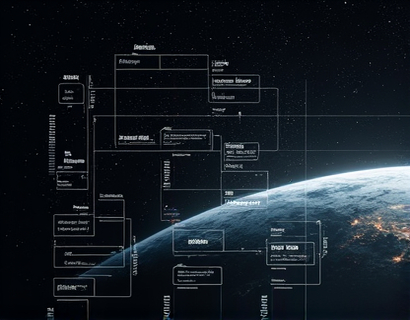Maximizing Leadership Efficiency: A Comprehensive Dashboard for Streamlined Team Management and Enhanced Productivity
In today's fast-paced business environment, effective leadership is crucial for driving success and maintaining a competitive edge. For business leaders and organizational managers, managing large and diverse teams can be a daunting task. The complexity of overseeing multiple departments, ensuring seamless communication, and making informed decisions can often lead to inefficiencies and bottlenecks. To address these challenges, a comprehensive dashboard has been developed, designed to streamline team management and enhance productivity across various industries. This advanced tool is not just a management solution but a strategic asset that empowers leaders to optimize their processes and achieve outstanding results.
Understanding the Need for a Comprehensive Dashboard
The traditional methods of team management, while effective to some extent, often fall short in handling the dynamic and multifaceted nature of modern organizations. Manual tracking, spreadsheets, and ad-hoc reporting can be time-consuming and prone to errors. A comprehensive dashboard addresses these issues by providing a centralized platform that integrates various aspects of team management. It offers real-time insights, automated reporting, and intuitive interfaces that simplify complex data into actionable information. This shift from manual to digital management not only saves time but also reduces the risk of human error, ensuring that leaders can focus on strategic initiatives rather than administrative tasks.
Key Features of the Dashboard
The dashboard is equipped with a suite of features tailored to meet the diverse needs of business leaders. One of the core functionalities is real-time monitoring. Leaders can track the progress of projects, monitor team performance, and identify potential issues before they escalate. This feature is particularly valuable in industries where timeliness is critical, such as manufacturing, healthcare, and finance.
Another essential feature is enhanced communication. The dashboard includes built-in communication tools that facilitate seamless interaction among team members, regardless of their physical location. Features like instant messaging, video conferencing, and collaborative document editing ensure that everyone is on the same page, reducing misunderstandings and improving collaboration. This is especially beneficial for remote teams and organizations with a global presence.
Data-driven decision-making is another cornerstone of the dashboard. Advanced analytics and reporting tools provide leaders with comprehensive insights into team performance, resource utilization, and project outcomes. These insights are presented in an intuitive and easy-to-understand format, allowing leaders to make informed decisions quickly. For instance, a manager in the retail industry can analyze sales data, customer feedback, and inventory levels to optimize stock and marketing strategies.
Streamlining Operations
One of the most significant benefits of the dashboard is its ability to streamline operations. By centralizing task management, assignment, and tracking, leaders can ensure that every team member is aware of their responsibilities and deadlines. The dashboard allows for the creation of custom workflows that can be tailored to the specific needs of different departments or projects. This flexibility ensures that the tool is not a one-size-fits-all solution but a versatile platform that adapts to various organizational structures and processes.
Automation is another key aspect that contributes to operational efficiency. Routine tasks such as scheduling, reminders, and status updates can be automated, freeing up time for leaders to focus on higher-value activities. For example, in the construction industry, the dashboard can automate the tracking of project milestones, material deliveries, and workforce availability, ensuring that projects stay on schedule and within budget.
Empowering Strategic Decision-Making
The dashboard empowers leaders to make strategic decisions by providing a holistic view of organizational performance. Dashboards within the platform offer customizable views that highlight key performance indicators (KPIs) relevant to the leader's role and the organization's goals. These KPIs can range from financial metrics like revenue and profit margins to operational metrics such as employee productivity and customer satisfaction.
For leaders in the technology sector, the dashboard can integrate data from various sources, including software development life cycles, user engagement metrics, and market trends. This comprehensive data allows tech leaders to identify areas for innovation, optimize resource allocation, and stay ahead of market changes. Similarly, leaders in the healthcare industry can monitor patient outcomes, staff workload, and facility utilization to enhance service delivery and patient care.
Enhancing Team Collaboration
Collaboration is at the heart of any successful organization, and the dashboard is designed to foster a collaborative environment. The platform includes features that promote teamwork and knowledge sharing. For instance, a project management module allows teams to collaborate on tasks, share files, and track progress in real-time. This module supports agile methodologies, making it ideal for software development and creative industries where flexibility and rapid iteration are essential.
The knowledge base feature is another valuable tool for enhancing collaboration. Leaders can create and manage a centralized repository of documents, guidelines, and best practices. This ensures that team members have access to the information they need, reducing the time spent on information searches and fostering a culture of continuous learning and improvement.
Recognition and rewards are also integrated into the dashboard, allowing leaders to acknowledge and reward team achievements. This feature boosts morale and motivation, encouraging employees to perform at their best. For example, a manager in the education sector can recognize teachers for exceptional performance or student achievements, fostering a positive and competitive environment.
Customization and Scalability
The dashboard is highly customizable, allowing leaders to tailor the platform to their specific needs. Whether it's adding custom fields, creating unique reports, or integrating with existing systems, the dashboard offers the flexibility required by diverse organizations. This customization ensures that the tool is not only effective but also aligns with the organization's unique processes and culture.
Scalability is another critical feature, enabling organizations to grow without compromising on efficiency. As the organization expands or new departments are added, the dashboard can easily accommodate the increased complexity. This scalability is particularly important for businesses that are rapidly growing or operating in dynamic markets where adaptability is key.
Case Studies and Success Stories
To illustrate the impact of the dashboard, consider a few success stories from different industries. In the manufacturing sector, a mid-sized company implemented the dashboard to manage its production lines and supply chain. The real-time monitoring and automated reporting features helped the company reduce production downtime by 30% and improve inventory management, leading to a significant increase in overall efficiency and profitability.
In the healthcare industry, a large hospital network adopted the dashboard to streamline patient care and operational processes. The enhanced communication tools and data-driven insights enabled the hospital to reduce patient wait times by 25% and improve staff satisfaction. The dashboard's project management module also helped in coordinating complex surgical procedures and emergency responses, enhancing patient outcomes.
A tech startup utilized the dashboard to manage its agile development teams and track project milestones. The customizable dashboards and real-time collaboration features allowed the startup to accelerate its product development cycle, launch new features faster, and gain a competitive advantage in the market.
Conclusion
The comprehensive dashboard represents a significant leap forward in leadership efficiency and team management. By integrating real-time monitoring, enhanced communication, data-driven decision-making, and collaborative tools, it provides a robust solution for business leaders across various industries. Whether you are managing a small team or a large, global organization, this dashboard offers the tools and insights needed to optimize your management processes and drive productivity. Embracing this advanced platform can be the key to unlocking your organization's full potential and achieving sustained success.










































